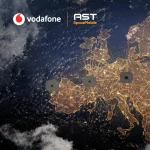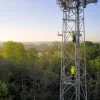Ofcom UK Sets Out Approach to LEO Broadband Satellites

The UK telecoms regulator, Ofcom, has today published their proposals for a new ‘Space Spectrum Strategy’, which among other things sets out their approach to supporting the growth of satellite broadband services, such as via the new mega constellations of Low Earth Orbit (LEO) platforms from SpaceX (Starlink) and OneWeb.
Until recently, most broadband internet connectivity services delivered to UK consumers via satellite came from huge double-decker-bus sized spacecraft (platforms) that were positioned high above the Earth in geostationary orbits (GEO / GSO) – often reflecting a distance of about 35,000km+ from the planet’s surface.
Such satellites can be constrained by limited peak capacity, take years to build and cost hundreds of millions of pounds each. The distances involved also mean that internet latency times are incredibly slow (figures of 600-2000 milliseconds can be seen – useless for fast-paced online video games etc.), while data allowances frequently came with strings attached and speeds could be poor due to congestion (especially at peak times).
Advertisement
By comparison, the new generation of Non-Geostationary Satellite Orbit (NGSO) satellites, such as the LEOs mentioned earlier, aim to eclipse the old solutions by creating vast constellations of significantly smaller satellites (needed because they sit much closer to the earth – typically around 500-1300km). When matched by enough ground stations and the right technologies, these can deliver 100Mbps+ speeds with fast latency times (c.20-50ms).

At the same time, it’s important not to forget the growing importance of satellite and space technologies for scientific exploration, defence and climate research, among other things. Ofcom’s proposed Space Spectrum Strategy (SSS) is working to consider all of these areas and to understand how it will affect various related aspects, such as future spectrum management and competition, over the next 2 to 4 years.
The proposals for NGSO satellite systems build on the changes Ofcom made to the licensing of these systems in December 2021 (here), which introduced new checks on potential interference between networks, greater transparency of licence applications and a requirement for different networks to co-operate with each other on technical matters to avoid the risk of disruption to their services.
Advertisement
Ofcom’s SSS Proposals
• We want spectrum to enable the space sector to deliver even greater benefits in the future, and for the sector to use spectrum efficiently.
• Our strategy particularly focuses on the opportunities and challenges raised by NGSO satellite communication systems. We want to see efficient spectrum use by these systems and for as many as possible to offer services to people and businesses in the UK.
• We have set out a range of actions in three areas where we think our efforts will have the greatest benefit over the next two to four years:
1) Communications – The size of the satellite communications sector is increasing, both in terms of the number of satellites and the number of new entrants, and NGSO satellite systems are creating new spectrum management challenges. We have introduced a new NGSO licensing process and will pursue improvements to international NGSO rules. We will also consider providing access to spectrum that could boost the capacity of a range of satellite services.
2) Earth observation and navigation – Data from Earth observation satellites provides benefits to many different sectors, such as agriculture, emergency services, climate monitoring and weather forecasting. We will consider protection for UK sites used for downlinking data from Earth observation satellites, and ensure that Earth observation sensors in space get appropriate protection from other users.
3) Understanding and enabling access to space – Given the rapidly rising numbers of space objects and proposals for mega-constellations, there are growing concerns across the space community about the potential for space debris and safe access to space. One change that we will consider is appropriate access to spectrum for radars to track objects in space.
• We are also planning cross-cutting work to further embed our overall spectrum management strategy. For example, we want to make it even easier for a broad range of space users to access spectrum. Some innovative projects in the space sector – particularly those using small satellites or ‘cubesats’ – do not always fall neatly within one of our existing licence products. So, we will identify frequency and authorisation options that may be relevant for these new cubesat applications.
In reference to point 1 above, which talked about providing access to spectrum that could be used to boost the capacity of satellite broadband services – this reflects a proposal for additional access to the 14.25 – 14.50GHz band. Naturally, faster satellite broadband speeds are always welcome, not least because some remote rural areas will find LEO based services to be very attractive, although cost is still a hindrance, but that’s another matter.
However, some of this work may criss-cross with areas managed by the International Telecommunication Union (ITU) Radio Regulations, and could also be impacted by international decisions made as part of the forthcoming World Radiocommunication Conference 2023 (WRC-23). Suffice to say, Ofcom needs to stay engaged with the global position on such topics.
Helen Hearn, Ofcom Interim Spectrum Group Director, said:
“While spectrum might be alien to some, we all rely on these invisible radio waves every day. And they’re vital to the rapidly growing space industry.
So as the next generation of satellites beam down vital information to us, we’re playing our part to help the sector continue its journey and make sure these enterprising pioneers have the launchpad they need.”
Ofcom’s consultation is set to close on 24th May 2022, and they aim to publish their final strategy in Q2 2022/23.
Mark is a professional technology writer, IT consultant and computer engineer from Dorset (England), he also founded ISPreview in 1999 and enjoys analysing the latest telecoms and broadband developments. Find me on X (Twitter), Mastodon, Facebook, BlueSky, Threads.net and Linkedin.
« Three UK Preparing to Launch Apple Watch and eSIM in Q2 2022
Vodafone UK Trial Creates First On-Demand 5G Network Slice »





















































Can satellites respect country boundaries when they are sending down their signals. Beam forming?
I did wonder how they respect boundaries between countries they do or don’t have permission to work in.
I think it’s more a case about licensing the respective ground terminals to operate (legally) within one’s jurisdiction- rather than carving out geographic areas from space.